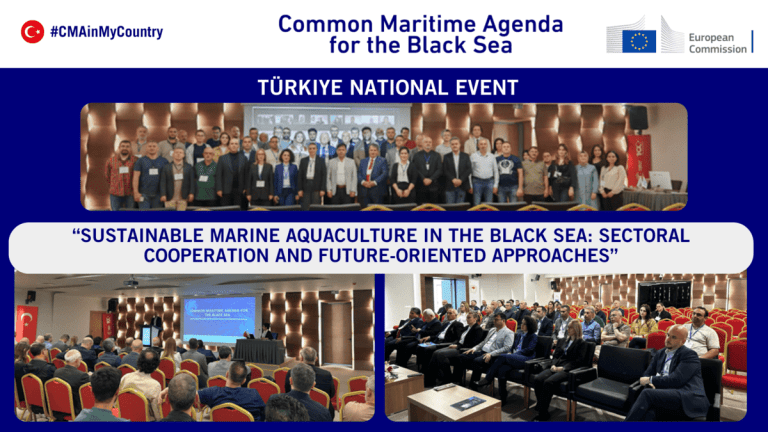On 29 May 2025, the Central Fisheries Research Institute (SUMAE) in Trabzon hosted Türkiye’s National Hub event under the Common Maritime Agenda (CMA) for the Black Sea. The National Event was organised under the coordination of the Middle East Technical University – Institute of Marine Sciences (METU-IMS, the BSAM National Hub) and supported by the Ministry of Agriculture and Forestry and the Ministry of Transport and Infrastructure of Türkiye, the CMA National Coordinator for Türkiye. The event “Sustainable Marine Aquaculture in the Black Sea: Sectoral Cooperation and Future-Oriented Approaches” was a follow-up to the first national event held in late 2023. It aimed to strengthen cross-sector collaboration and develop actionable strategies for resilient and sustainable marine aquaculture in the Black Sea. The event is expected to contribute to the CMA’s Technical Group on Sustainable Aquaculture (SustAqua) and help shape Türkiye’s future roadmap in the sector.
The workshop was a hybrid event, which brought together more than 100 participants from academia, government institutions, the private sector, and international organisations involved in marine aquaculture and blue economy sectors. The event provided open dialogue, contribution of ideas, and collaborative thinking, focusing on three main goals:
Assessing the current state of marine aquaculture in the Black Sea, identifying priorities, challenges, and opportunities in line with Türkiye’s CMA commitments.
Promoting knowledge exchange among public institutions, academia, and the private sector, especially around innovative practices such as algae integration and sustainable feed alternatives.
Encouraging cross-sectoral partnerships and generating project ideas aligned with EU funding mechanisms and the CMA SustAqua Technical Group’s agenda.
To guide the discussions, a pre-workshop survey was circulated, based on the outcomes of the previous 2023 national workshop, so participants could focus on key themes and shape the agenda of the follow-up event.
The thematic sessions introduced of the event, such as environmental sustainability, policy alignment, and value chain integration in marine aquaculture, encouraged participants to reflect on how to advance sustainable practices in the Black Sea region. These sessions in the workshop concluded with a final and open discussion session, where participants shared insights from the survey, voiced their expectations and concerns, and proposed ideas for cross-sectoral collaboration possibilities in advancing sustainable marine aquaculture in the Black Sea.
Key takeaways included:
The need for a robust environmental management and regulatory framework with active stakeholder involvement,
Enhanced communication between stakeholders,
Greater access to funding schemes,
Better alignment of production with market demands and consumer expectations.
One concrete and promising idea discussed was the integration of algae-based protein sources into cage farming systems, a novel approach with strong potential for pilot studies to improve feed efficiency and environmental performance.
The workshop successfully fostered interdisciplinary dialogue and generated actionable ideas for future projects in sustainable marine aquaculture in the Black Sea. It reinforced the importance of continued collaboration under the CMA framework and laid the groundwork for turning discussions into practical, fundable initiatives that support the blue economy in the Black Sea region.

